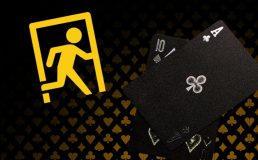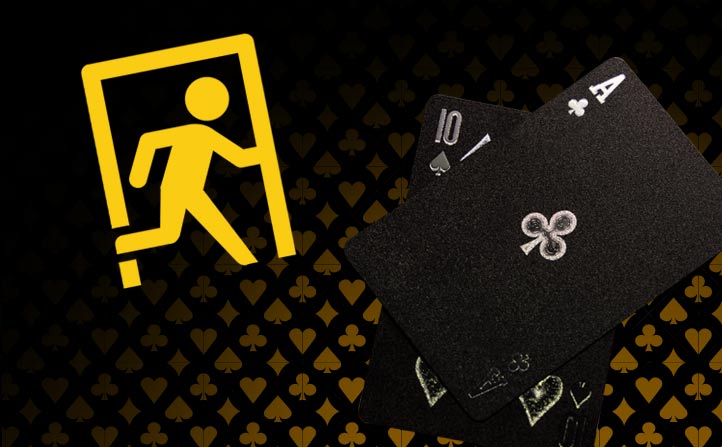 Interested in perfecting your blackjack gameplay? There is much more to basic blackjack strategy than first meets the eye. There’s an optimal time for everything: hitting, standing, splitting and doubling down. Blackjack games that offer the option to surrender may lower the casino’s edge slightly, but the player must time their moves perfectly.
Interested in perfecting your blackjack gameplay? There is much more to basic blackjack strategy than first meets the eye. There’s an optimal time for everything: hitting, standing, splitting and doubling down. Blackjack games that offer the option to surrender may lower the casino’s edge slightly, but the player must time their moves perfectly.
So, what is surrender in blackjack, and when should you opt in? Explore the depths of blackjack surrender and learn how to build your blackjack surrender strategy in this guide.
WHAT IS SURRENDER IN BLACKJACK?
Surrender is one more move when you play blackjack, much like the options to hit and stand. What it is, is not too different from the definition of the word itself: when you choose to surrender in blackjack, you effectively remove yourself from the game.
If you surrender your hand, you forfeit the play and half of the wager placed on that hand. In other words, surrender is when the house allows the player to fold before drawing cards.
Two cards will be dealt to the player face up, and the dealer will receive one card face up (upcard). The dealer’s second card (hole card) will be laid on the table after the player’s initial cards have been dealt, facedown.
The rules of the game remain the same — players must reach a point total that is equal to, or as close as possible to, 21 without going over and while beating the dealer’s hand.
Like splitting and doubling down, one should note that not all blackjack games have a surrender rule. It comes in two forms, both of which have their individual uses, merits and drawbacks. Let’s take a closer look at surrender rules in the next section.
BLACKJACK SURRENDER RULES AND TYPES OF SURRENDER
Blackjack players have two forms of surrender in their overall arsenal: early surrender and late surrender. Surrender rules may depend mainly on the particular edition of blackjack and the house rules.
Other factors, like how many decks are used, influence your odds for the option. The basic strategy behind surrendering hinges on whether the dealer hits or stands on soft 17.
To understand blackjack surrender rules better, let’s take a closer look at how they work.
EARLY SURRENDER
An Early Surrender rule is available pre-peek, allowing players to surrender their hand to a dealer’s ace or 10 upcard before the dealer checks if they have blackjack. An early surrender rule is more favourable for the players, but limitations vary from casino to casino. In fact, you’ll rarely find this rule available. Macau casinos, for example, only permit an early surrender on a dealer’s 10-value upcard and not the ace.
The Early Surrender strategy is more straightforward, as broken down below:
- Surrender a hard five-seven and 12-17 against the dealer having an ace.
- Surrender a hard 14-16 against the dealer’s 10.
- Surrender pairs of threes, sixes, sevens and eights against the dealer’s ace.
LATE SURRENDER
The only time a late surrender is available is after the dealer checks their hole card when showing an ace or a 10 to determine whether or not the hand is a blackjack. If it is, the Late Surrender option will no longer be available, and the bet is lost (unless the player also has blackjack).
Correct use of Late Surrender rules can reduce the casino’s edge by approximately 0.07% on tables played with more than a single deck. On multi-deck blackjack, late surrender is advisable in the following circumstances.
S17 decks (when the dealer stands on a soft 17).
- Surrender if you hold 16 and the dealer’s upcard is 10 or ace.
- Surrender if you hold 15 and the dealer has a 10 upcard.
H17 decks (when the dealer hits soft 17).
- Surrender when you hold a 15 and the dealer shows a 10 or ace.
- If you hold 16 and the dealer shows an ace, you should surrender.
- Surrender on a 17 if the dealer has an ace.
- For a pair of eights, the rule is to surrender when the dealer has an ace. In all other cases, a split is advisable.
WHY SURRENDER IN BLACKJACK?
As you may have noticed, blackjack games that offer surrender are not significantly different from a classic blackjack table. The only difference is that players can forfeit their hand before drawing additional cards in return for half of their original bet.
Based on the value of the face-up card and your initial cards, you must make an educated guess about the probability of winning this hand. When the cards have been dealt, you can hit, stand, split, double down or surrender.
Hitting will draw one more card, and standing leaves your hand as is. Doubling down will double your bet in return for only one more card, and splitting is only available on a pair. Surrendering forfeits the hand in return for half your wager placed should the dealer check their hole card and find blackjack.
Looking at the basic rules of early surrender and late surrender, you might still be pondering the benefits. Despite some negative connotations, it can be a strategically advantageous move to surrender in blackjack, particularly in fast-paced play at online casinos.
Surrender acts as a way to save half your bet should the table permit you, so it’s in your interest to keep up with all the options on offer and to consider your moves carefully.
WHEN SHOULD YOU SURRENDER IN BLACKJACK?
Keep in mind that there are never any guarantees, but there are ways to empower your win potential. The option to surrender in blackjack is one such tool at your disposal.
It all comes down to probability. In the scenarios above, your hand has less than a 25% chance to beat the dealer. Were the move not an option, even the most skilled players would very likely lose money.
The math behind the Surrender rule is that if your chances of winning are less than one out of four hands, then playing the hand yields a less than 25% chance of a win and over a 75% chance of a loss.
Statistically speaking, surrendering, in this case, will save a wider portion of your bankroll than playing the hand would, in the long run.
DOES SURRENDER AFFECT THE EDGE OF THE HOUSE?
Blackjack is one of the casino games with the lowest house edge of just under 1%. Blackjack games that offer Late Surrender have a house advantage of approximately 0.08% lower than blackjack without it.
When Early Surrender is available, surrendering against the dealer’s ace or ten increases the RTP (return to player) by 0.39% and 0.24%, respectively. This roughly translates to a decrease of 0.63% in the house edge.
Remember that blackjack tables with surrender may have different payout odds, such as 6:5 on blackjack, which would add 1.39% to the house edge, bringing it up to nearly 2%. When employing a basic surrender strategy, make sure you are playing a game with a payout of 3:2 on blackjack.
On top of that, multi-deck tables increase the casino’s edge. This difference may be slight, but it can significantly impact a player’s gameplay in the long run by avoiding larger losses and strategically employing probability.
ADVANTAGES AND DISADVANTAGES OF BLACKJACK SURRENDER
Here’s a basic table of pros and cons for making this move when you play blackjack.
| ADVANTAGES | DISADVANTAGES |
| You only lose half your initial bet in a game. | The number of decks in a game influence your winning odds. |
| In the long run, you can save money by using this move wisely. | Casino operators may impose certain restrictions |
| It can help reduce the house advantage. | The option is not widely available. |
BLACKJACK SURRENDER ONLINE
In online casinos, tables with a surrender option available are called Blackjack Surrender. If you’d like to get acquainted with surrender in blackjack, LV BET has some of the biggest and boldest Blackjack Surrender variants to play, including Atlantic City Blackjack and European Blackjack!
Bear in mind that, in general, an online game will feature the Late Surrender option only. However, there may be few titles with an Early Surrender option, too, so you can explore the nuances of both if you please!
CONCLUSION
Before you play Blackjack Surrender or any other game online, check the rules to ensure that the option is available. If you’re playing at a land-based casino, don’t hesitate to ask the dealer if they have any surrender-friendly tables.
Additionally, it is vital to remember that using any strategy does not guarantee positive results for all players and that approaches may differ. Don’t attempt any strategy without thoroughly researching the topic and learning about the intricacies and pitfalls.
Finally, remember to establish a manageable bankroll and start with small wagers to cover all your bases.
FAQ
✅ WHAT BLACKJACK SURRENDER RULE SHOULD I CHOOSE?
Whichever rule the player decides to use is up to their own judgment. In general, Early Surrender has better odds for a player, but a large chunk of the games that offer any surrendering option at all, offer Late Surrender only.
✅ HOW CAN I SUBMIT A BLACKJACK SURRENDER REQUEST?
If you are playing in a land-based casino, hand signals are used in blackjack to signify your intent. Make a little line with your index finger behind your cards. You can also announce you want to surrender your hand. If playing blackjack online, hit the ‘Surrender’ button.
✅ CAN I USE MY DEPOSIT BONUS ON BLACKJACK SURRENDER GAMES?
Any casino that you choose to play at, may award bonuses to use on their games. If you haven’t signed up with LV BET yet, you’ll be pleased to know that we offer a range of bonuses including a Welcome Bonus for newly-registered players as well as a bonus on your first deposit, and many more! While rewards may vary, you may be able to cop a few bonus funds to use on all of our epic tables.
✅ WILL SURRENDERING IN BLACKJACK MAKE ME MONEY?
Every hand you give up results in a loss. However, a surrendered hand will lose half your original wager, whereas a hand that stands loses the other half as well. Therefore, surrendering will not make you money, but it can work to save it.
